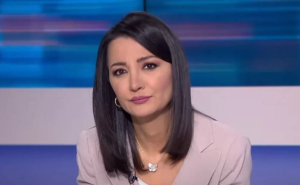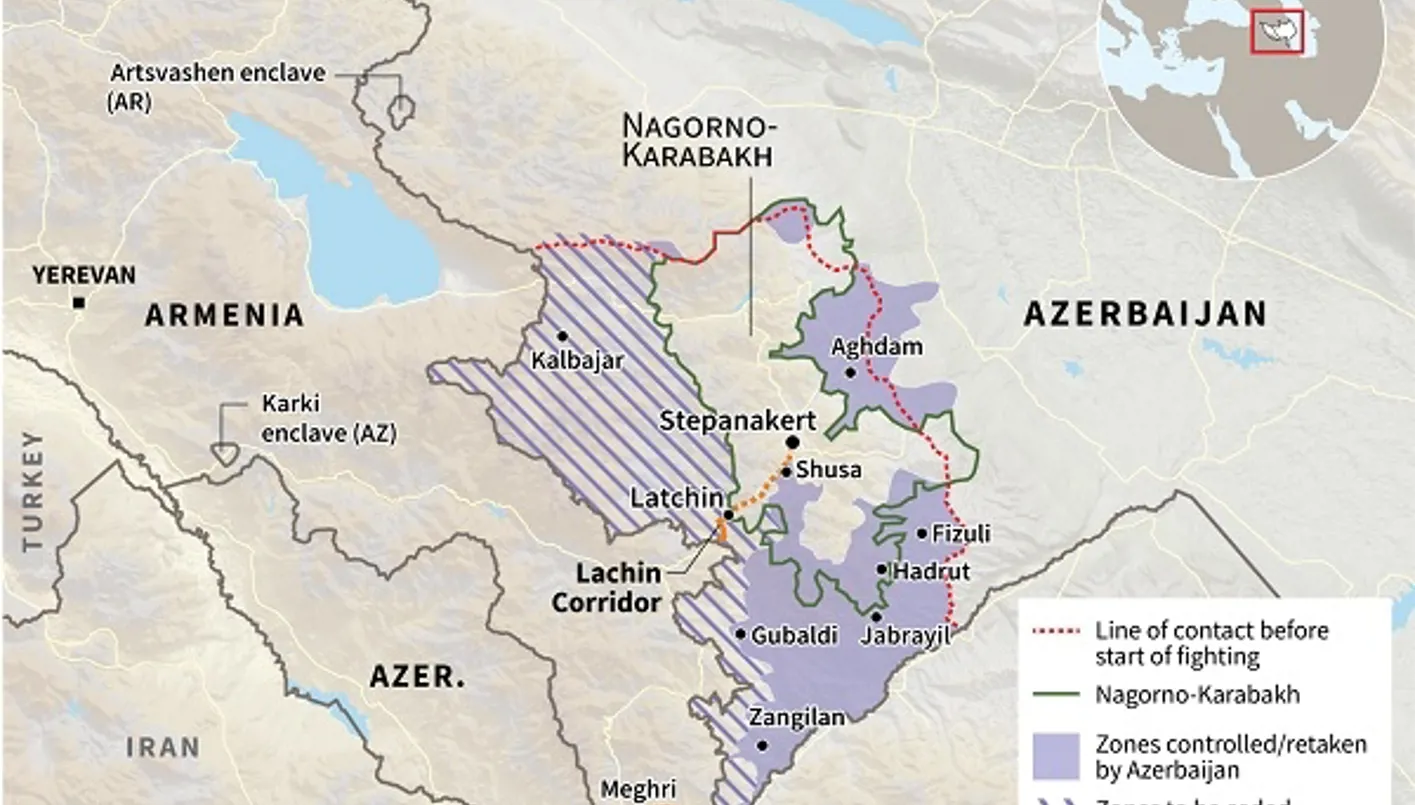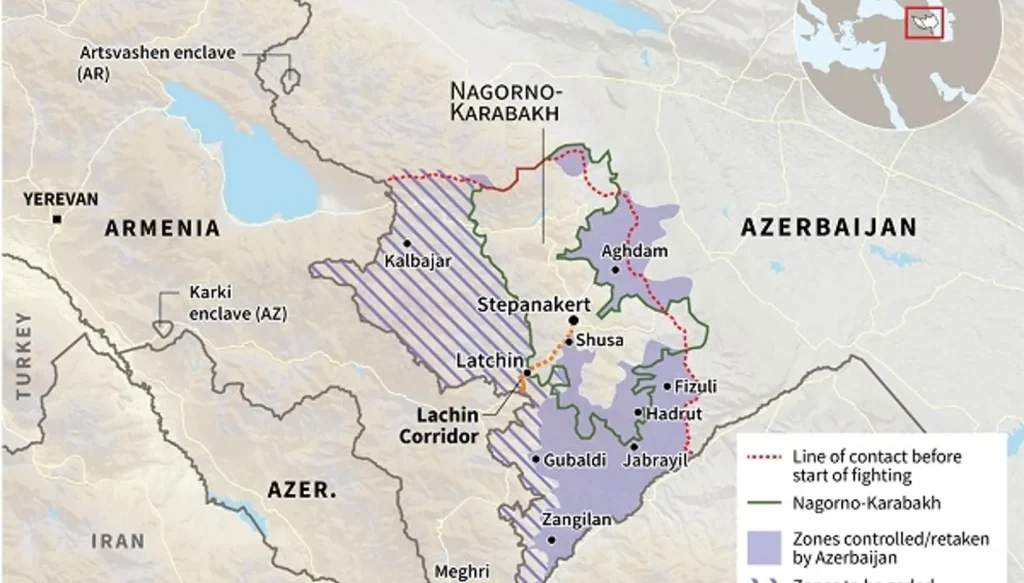Located in the Caucasus region, Azerbaijan stands out as a pivotal strategic player whose influence extends beyond its borders. Thanks to its sensitive location, vast oil resources, and complex international relations, Baku today is a meeting point for conflicting interests and a major partner in unexpected alliances. This unique dynamic raises vital questions: Why is Israel and the United States increasingly interested in Azerbaijan? What role does it play in redrawing the contours of the “New Middle East”?
Geography and history fuel the conflict
Geography and history shape a complex relationship between Azerbaijan and Iran.
Geographically, Azerbaijan occupies a strategic position at the heart of a power struggle, located between Russia and Iran and overlooking the Caspian Sea. Disputes over maritime borders in the Caspian Sea are a source of tension between the two countries. Azerbaijan also suffers from a “geographical distortion” due to the existence of the Nakhchivan exclave, which is separated from the main territory by Iran, Armenia, and Turkey.
Historically, Azerbaijan was part of the Persian Empire before the 19th-century division, which remains a major source of tension. Following bloody wars between Persia and Tsarist Russia, Tehran lost vast territories north of the Aras River under the Treaties of Gulistan (1813) and Turkmenchay (1828). These territories eventually became the independent Republic of Azerbaijan after the Soviet Union’s collapse.
This division still shadows relations; Iran considers part of its land forcibly taken, while Azerbaijanis see the separation as a natural outcome of national unity aspirations. The presence of millions of Azerbaijanis in northwest Iran raises Tehran’s fears of “Greater Azerbaijan” calls.
Tensions escalate as Baku accuses Tehran of attempting to expand influence inside Azerbaijan through religious and sectarian tools.
Besides historical and national dimensions, ideological, cultural, and political differences deepen the rift. Although 85% of Azerbaijan’s 10.5 million people are Shia Muslims, the country’s secularism sharply contrasts with Iran’s theocratic regime. Cultural and linguistic closeness to Turkey, due to the official Turkish language, fuels Iran’s discomfort with rising Turkish nationalism in its neighbor. Conflicting alliances further intensify tensions: Azerbaijan aligns with Israel, while Iran supports Armenia in the Nagorno-Karabakh conflict.
All these factors make the relationship complex and tense on multiple levels.
Conflict with Armenia
Azerbaijan and Armenia, former Soviet republics, began their conflict over Nagorno-Karabakh immediately after declaring independence in December 1991. Armenia sought to annex the region and control corridors linking it, while Azerbaijan aimed to regain control of the vital Zangazur corridor connecting it to Nakhchivan. Two wars ensued: the first ended in 1994 with an Armenian victory backed by Russia; the second, in 2020, saw Azerbaijan reclaim the region with Turkish military support.
The 1994 defeat pushed Baku to seek allies beyond Russia’s orbit, leading to a strategic partnership with Israel, one of the first countries to recognize Azerbaijan’s independence. Azerbaijani President Ilham Aliyev described this relationship as an “iceberg,” with only 10% visible, indicating much deeper cooperation.
Economically, Israel imports 40-60% of its oil needs from Azerbaijan via a pipeline through Turkey, ensuring a stable and nearby energy source. Strategically, Israel benefits from Azerbaijan’s border with Iran, using it as an intelligence asset to monitor Tehran’s nuclear program and regional activities.
Israel also provides multifaceted support beyond the military, including advanced drones, missile defense systems, agricultural technology, water management, and cybersecurity. It leverages its political influence in the West, especially Washington, to support Azerbaijan.
Calls have emerged from the US and Israel to include Azerbaijan in the Abraham Accords, launched by President Donald Trump in 2020 to expand Arab-Islamic normalization with Israel. However, the real aim appears to be integrating Azerbaijan into a US-Israeli alliance to counter Iran.
After the recent 12-day war, Israel and Iran prepare for a possible new round, with Washington and Tel Aviv rallying regional support. Azerbaijan’s geographic position on Iran’s border makes it a key potential player in any upcoming regional conflict.
Zangazur Corridor
The Zangazur corridor is a cornerstone in reshaping the region, with Baku eager to open it through southern Armenia despite Armenian opposition. Beyond a trade route, it is likened to a “land-based Suez Canal” connecting Asia to Europe while bypassing Iran and Russia. Its geopolitical importance lies in linking Azerbaijan and Turkey, deepening their strategic alliance and turning the corridor into a Turkish-Azerbaijani sphere of influence.
In a potentially game-changing move, the US proposed a new mediation initiative in August 2025 called the “Trump Road to Peace and Prosperity,” which includes opening the Zangazur corridor under Armenian sovereignty in exchange for transit fees.
Opening this corridor would bring major regional shifts, granting the US and allies access to the Caucasus heartland, pulling Armenia out of Russia’s orbit, and limiting Iranian influence.
Azerbaijan as a Rising Power
Recent moves show Azerbaijan no longer content as just an energy hub but aspiring to be a significant political player. Baku pursues a cautious yet ambitious policy, not publicly hosting foreign military bases but keeping the option as strategic leverage. Its influence extends to major regional issues, playing indirect roles in conflict resolutions, such as potential mediation in Syria-Israel normalization talks.
Simultaneously, Baku strengthens energy ties with Syria and Israel, raising the possibility that some Azerbaijani companies operating in Syria serve as fronts for Israeli firms.
In conclusion, developments in the South Caucasus are closely linked to the Middle East. Azerbaijan maintains a “cold peace” with Armenia, “strategic warmth” with Turkey, and “clear support” from Washington and Tel Aviv, granting it significant influence and placing it at the center of regional map reshaping.
Will the price be a direct or indirect confrontation with Iran in the near future?














Recommended for you
Exhibition City Completes About 80% of Preparations for the Damascus International Fair Launch
Talib Al-Rifai Chronicles Kuwaiti Art Heritage in "Doukhi.. Tasaseem Al-Saba"
Unified Admission Applications Start Tuesday with 640 Students to be Accepted in Medicine
Egypt Post: We Have Over 10 Million Customers in Savings Accounts and Offer Daily, Monthly, and Annual Returns
His Highness Sheikh Isa bin Salman bin Hamad Al Khalifa Receives the United States Ambassador to the Kingdom of Bahrain
Al-Jaghbeer: The Industrial Sector Leads Economic Growth